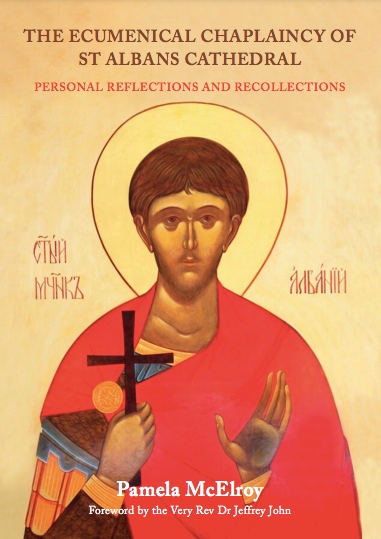The Ecumenical Chaplaincy of St Albans Cathedral by Pam McElroy
Labour of love documenting many reflections and stories from those involved in the life of the ecumenical chaplaincy of St Albans Cathedral over 40 years
 The Ecumenical Chaplaincy of St Albans Cathedral
The Ecumenical Chaplaincy of St Albans Cathedral
By Pam McElroy
Independent Publishing Network
ISBN: 978-1-80049-395-7
Reviewed by Terry Young
Every book is an adventure, and I’d had a bit of an adventure before I even started reading. One day, another book arrived for review with a note from Pam inside. However, the note and the book it was with were clearly from two different conversations. I emailed and eventually worked out what had happened. Paul (our editor) extended an invitation to Pam, who sent me a copy and now I am reviewing it.
I have a lot of sympathy for Pam because I know how hard it is to get things published, and this was clearly a labour of love for her. Reading a manuscript you would not normally follow because you admire the commitment and the energy of the author is something I have a little experience in – preparing to examine students on their doctoral dissertations, for instance – and it is always an intriguing encounter.
Most of the things that attract Pam to ecumenism leave me cold, while most of what attracts me to ecumenism doesn’t appear to have crossed Pam’s mind, so we are clearly very different people. The key question was, what could I learn from Pam and the work she has put into chronicling 40 years of shared worship at the Cathedral, that had crossed the major doctrinal lines – Anglican, Roman Catholic, Free Church and Russian Orthodox – since 1980?
If this book is an adventure, it’s also a puzzle and is unlike most of my other reading. Because of that, it really must be judged on its own terms, which means you have to spend some time working out what those terms are.
First, then, this is a book about devotion. It is dedicated to Pam’s late husband Michael, whom she married across doctrinal divides. Beyond that, the details she revels in – who went on pilgrimage where, which mass was celebrated when – clearly mean a lot to her. So much so that, even as she tries to narrate her story through the actors in this grand project, she cannot escape the gravitational pull of artefacts and events.
Second, it is a book about context, about a time of thawing relations, politically and between denominations, with occasional crossovers, for instance, as Russians emerging from the Soviet Union’s breakup had to decide which limb of the family tree they would choose to reconnect with. Feelings ran high over shared services and people protested to Deans and even to Her Majesty. Lines were drawn and then stepped over, creating an edge that is captured here.
Third, it is a book about events, Royal visits, visits by spiritual leaders, pilgrimages and anniversaries. There is a table on p 2 that provides a reference as to who was around when, but it would have been fun to have a timeline to connect these events.
Fourth it is a book about artefacts – a relic from St Alban’s shoulder, a set of sculpted images of saints, even the organ where a Methodist musician played for Roman Catholic congregations for more than 20 years, not to mention a bell and a pair of stained-glass windows. Each clearly carries deep memories and emotive appeal for Pam. I can observe it, even if I haven’t managed to enter into it with Pam.
I can understand that these have captured Pam’s heart, but I cannot quite see why. To me, it still looks like ecumenism for ecumenism’s sake. I can understand ecumenism for love: my paternal grandparents from either side of the divide in Ireland married, although sadly they abandoned faith altogether until close to my grandmother’s death, while I don’t really know where my grandfather stood in the end. I can understand being frustrated by the doctrines that divide: my missionary parents couldn’t marry until my father left his interdenominational mission and joined my mother’s interdenominational mission (and eventually they both had to leave because of his eschatology).
As a protestant, I owe a lot to the few Catholic writers I have lingered with – Brother Lawrence for his spirituality or GK Chesterton for his wild theology. I was hoping to scent some of these loves in Pam’s writing, but I think we are just devoted to different things.
This book will take a bit of chewing over, but Pam has opened her heart to us. There are lots of intriguing incidents and insights, and I’m so pleased to have read it.
My favourite quote? Well, it’s on p 21, ‘When Paul [Rev Paul Dean] and his Catholic colleague (Fr Michael Connor) described how the Chaplaincy worked, the Duke of Edinburgh said, “I suppose God wouldn’t mind!”’ Quite!
All proceeds and sales from this book are being split between St Albans Cathedral and the Association of Interchurch Families. Contact Pam McElroy to order a copy: pam.mmcelroy@gmail.com
Professor Terry Young is an author and member of a Baptist church. He set up Datchet Consulting which combines his experience in industry and academia
Baptist Times, 10/06/2022